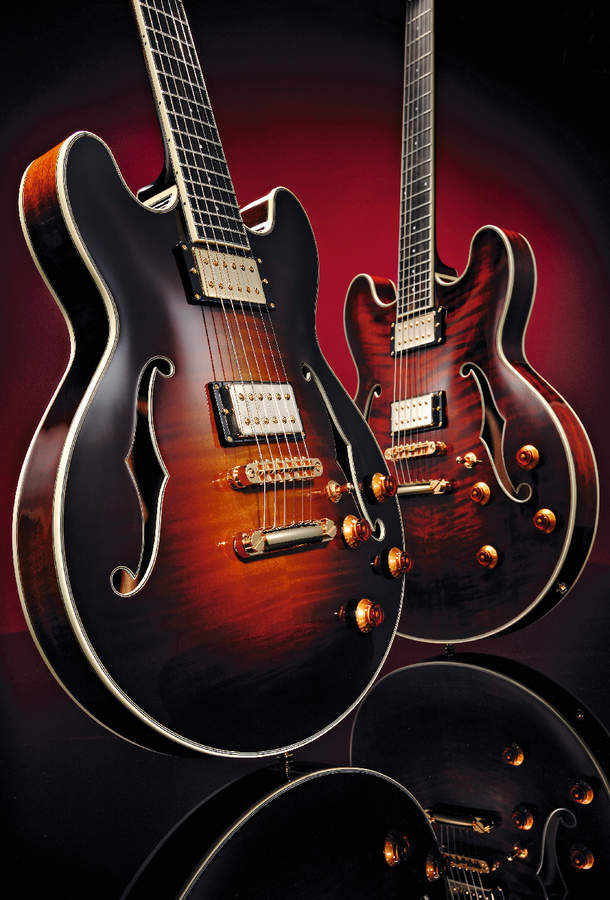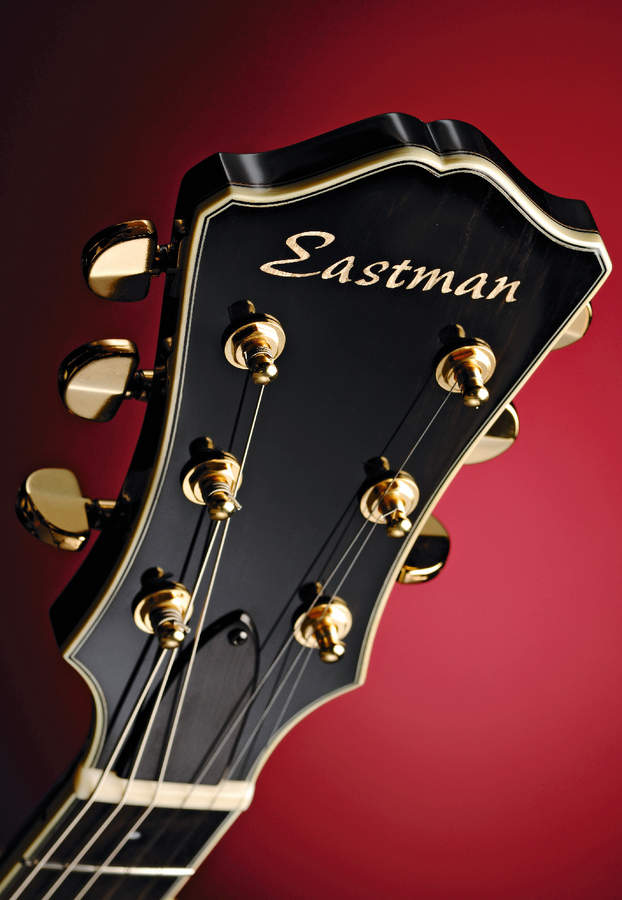MusicRadar Verdict
Top spec and great build for under a grand. Also easier to manage than a 335.
Pros
- +
Very nicely built with a warmer jazz vibe.
Cons
- -
The lack of depth in the lower register.
MusicRadar's got your back

Eastman's gorgeous looking T184MX (foreground).

A flared peghead is 'jazz', but it also means steep G- and D-string angles at the nut.
The thinline semi has recently seen a massive rise in the popularity polls. Not only does it have that special vibe - think John Lennon's Casino and BB's Lucille, to name but two - but it also offers you a wealth of sonic possibilities, from acoustic-sounding chordal accompaniment to full-blown driving electric lead.
Eastman has recently introduced a clutch of these thinline beauties to complement its full-bodied jazz boxes and flattop acoustics. Made in Eastman's own factory in China, they are, apparently, totally hand-built with not a modern machine in sight.
Made from solid woods (not laminates), 90 per cent of which are shipped into the factory from Canada, Eastmans come with hand-carved bodies, and are made using quite traditional woodworking methods.
Of the three double-cut models available, we're looking here at the 356mm (14-inch) wide T184MX. It has a tune-o-matic-style bridge with a stud tailpiece, and a beautifully flamed maple top, setting off its glamorous gold hardware to a tee.
Overview
The T184MX has a small body and will suit those players moving over from a solidbody or those who simply find the ES-335 style guitar just physically too big.
Fitted with a similarly two-piece hand-carved maple top and large f-holes together with mahogany two-piece back and sides, the main constructional difference between the 186 and the 184 is the latter's one piece mahogany, slim 'C'-profile set-neck.
Hardware, electronics, frets and markers all remain the same here, though the two tone and two volume controls on this smaller body feel a little too crammed into the lower bout, with the neck pickup tone control almost sitting on the lower rim.
Strung with a set of D'Addario 0.010s, the 184 lacks the depth and the dynamics of a bigger guitar - there's not as much punch in the top end and it's a trifle muddy down below, too.
However, it does produce a beautifully warm and mellow 'jazz' tone from the neck pickup and can be cajoled into delivering a very refined acoustic-like sound for chordal work.
Balance across the strings is very good, but again the 184 lacks the clarity and separation of a larger instrument.
Overdrive doesn't do the 184 too many favours either as, once again, it reinforces the lack of definition and lightweight nature of the lower register.
But this small bodied baby does display exceptional sustain characteristics and, when used in cleaner environments, displays plenty of potential.
This is an exceptionally well-balanced, lightweight instrument that really hits the mark in the slimline stakes.
And while it may not be the cheapest semi around, its solid wood construction and hand-carving, together with the classy Alnico Kent Armstrong pickups, give it a build quality that may cause some of the competition to take a deep breath and return to the drawing board.
With its latest free update, Ableton has finally turned Note into the app I always wanted it to be
Technically capable, but struggle to make your tunes sound musical? 5 simple music theory hacks to make your tracks stand out
"Despite its size, it delivers impressive audio quality and premium functions as well as featuring a good selection of inspired sounds": Roland GO:Piano 88PX review









